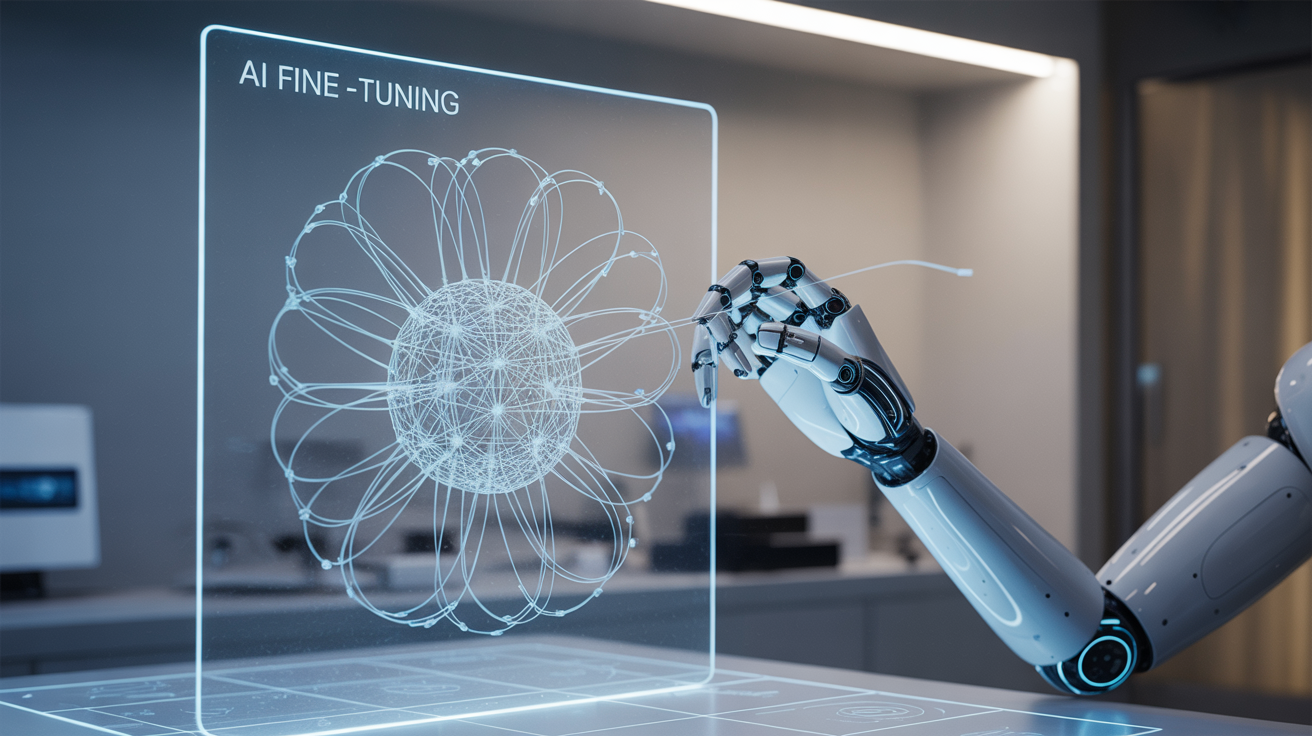Home / Blog / AI Fine-Tuning: Tailoring AI Models for Business Success
AI fine-tuning is the key to transforming general AI models into powerful, business-specific tools. By training AI on your company’s unique data, you can create highly accurate chatbots, recommendation engines, summarization tools, and more — tailored to your workflows and customers. This blog explains what AI fine-tuning is, why it’s important, how it works, real-world examples, key benefits, challenges, and how businesses can start fine-tuning AI models to gain a competitive advantage.
27 Jun, 2025

What Is AI Fine-Tuning?
AI fine-tuning is the process of taking a pre-trained AI model (like GPT, BERT, or image recognition models) and training it further on your business-specific data to customize its outputs.
It’s like teaching a highly intelligent employee the specifics of your company, industry, products, and workflows without starting from zero.
Fine-tuning adjusts the AI to better understand your terminology, processes, customer needs, and tasks, making it far more useful than generic, off-the-shelf AI models.
Why Fine-Tune AI Models for Your Business?
Pre-trained AI models are designed to be general-purpose. But your business isn’t generic. You have industry-specific language, customer expectations, and processes.
Fine-tuning allows businesses to:
· Improve accuracy for specific tasks.
· Deliver more relevant responses or outputs.
· Build AI tools that are aligned with internal workflows.
· Maintain competitive differentiation by embedding unique business knowledge into AI models.
Common Applications of AI Fine-Tuning:
1. Industry-Specific Chatbots
· AI that understands your products, services, policies, and customer FAQs.
2. Recommendation Engines
· Personalized product, content, or service recommendations based on your unique customer behaviors.
3. Document Summarization Tools
· AI models trained on your business documents to summarize contracts, reports, or technical papers.
4. Language Models for Specific Fields
· AI that speaks the language of law, healthcare, finance, manufacturing, or retail accurately.
Real-World Use Cases:
· Healthcare: AI models fine-tuned to understand medical terms, patient records, and diagnosis codes.
· Finance: AI trained to handle financial statements, credit reports, and risk analysis.
· E-commerce: AI assistants that recommend products based on past purchases and trends unique to that store.
· Customer Service: Chatbots that handle complex product support or policy queries for industries like insurance or SaaS.
· Manufacturing: AI that interprets maintenance logs, predicts equipment failures, or summarizes technical manuals.
Key Benefits of AI Fine-Tuning:
· High Accuracy: Models trained on your data perform tasks with precision.
· Relevance: Outputs are tailored to your industry, company, and customers.
· Faster Deployment: Leverages existing models no need to build from scratch.
· Cost-Efficient: Cheaper than training full models while offering high performance.
· Competitive Edge: Proprietary AI knowledge stays within your company.
Challenges to Consider:
· Data Privacy: Fine-tuning requires sensitive internal data handle it securely.
· Data Quality: Poor data leads to poor AI performance.
· Cost: Fine-tuning is cheaper than full training but still requires compute resources.
· Overfitting Risks: Models trained on too narrow data may struggle with broader tasks.
How the AI Fine-Tuning Process Works?
1. Define the Use Case:
· What problem are you solving? Chatbots, content generation, summarization, or predictions?
2. Collect and Prepare Data:
· Gather internal datasets: emails, chat logs, documents, customer interactions, reports.
· Clean and structure data for training.
3. Choose the Base Model:
· OpenAI’s GPT models, Google’s BERT, Meta’s Llama, or image models like Stable Diffusion.
4. Fine-Tune the Model:
· Adjust the model on your dataset using machine learning pipelines.
5. Test and Validate:
· Check accuracy, relevance, and performance on real tasks.
6. Deploy:
· Integrate into your app, website, internal tool, or customer service system.
7. Monitor and Update:
· AI needs regular updates as your business evolves.
The Future of AI Fine-Tuning for Businesses:
Soon, AI fine-tuning won’t be optional it’ll be the standard. Businesses will fine-tune AI models for every function: sales, marketing, HR, operations, and customer support.
Expect AI copilots tailored to each company understanding its products, tone, customers, and workflows intimately. But with this power comes responsibility businesses must ensure ethical usage, avoid biases, and protect data privacy at every step.
Off-the-shelf AI is powerful but fine-tuned AI is transformational. At 10Turtle, we help businesses customize AI models to perfectly match their industry, workflows, and goals. From smarter chatbots to domain-specific AI tools, we guide you from data preparation to deployment.
Let’s build AI that speaks your business
language.
Book your free consultation with our AI specialists today.